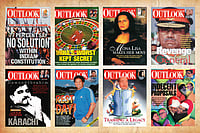HE certainly does not look like a poet, this tall, rugged, thickset, Pakistani, Pushto-speaking Pathan, with bushy eyebrows and a gravelly voice who goes by the name of Faraz Ahmed Faraz. He was in Delhi to participate in the Ghalib Bicentenary Mushaira held last week.
Certainly not your archetypal delicate custodian of a more delicate ahlezubaan, Urdu. Yet it's not an AK-47, but a pen that he wields. And uses like no other. So effectively in fact, that today he's likened to the legendary poet, the late Faiz Ahmed Faiz. Eminent Indian poet Ali Sardar Jafri calls him "the most important poet of the subcontinent, an agitational poet par excellence whose poetry is marked by sweetness and lyricism." Litterateur Raees Mirza claims he is the "next Faiz whose shumaar (body of work) is among the mumtaz shora (premier poetry) of the continent." Laconic writer Qurratulain Hyder, no mean literary figure herself, offers what people in the know rate as high praise: "He's an extremely interesting poet." Long-time friend Sadia Dehlvi, once a columnist for Urdu magazines Shama and Bano, calls him an "enduring" poet. "Even though he's written powerful protest poetry, he's not a daur ka shaayar (a poet of a time)," she says. "There's a quality of grace, a tremulous sensitivity, an ineffable beauty in his works about human relationships that has timeless appeal. Faraz's poetry will certainly outlive him."
And to think this man, who has been given his country's highest literary awards, almost missed his vocation. "I wanted to be a pilot. My family wanted me to become a doctor. I became neither." No flights for Faraz, except those of the imagination.Flights that landed the protest poet in jail. During the '70s, when Bhutto's army brutally raided Baluchistan and shot four students protesting this move at a Lahore rally, Faraz penned a stinging condemnation called Peshewar Qatilon (Professional Murderers), which led to him being marched off to two months solitary confinement at Attock prison. When released, he went to Karachi to recite Muhasra (The Siege). Mera qalam nahin kirdar us muhafiz ka/ Jo apne shehr ko mehsoor kar ke naaz karein (No custodian of my pen is he/ That besieges his own land with impunity). He was rearrested. This time by Zia-ul-Haq. Upon his release, a disgusted Faraz took exile in London for the next seven years, only to return once the dictator and his regime crashed.
Today, the Islamabad-based poet is politically and economically rehabilitated. As eminence grisé, director general of the Academy of Letters. Political tumult, if not awareness, is a thing of the past. It's time for mists and mellow fruitfulness. The sha-yar that gave us the celebrated Ranjish hi sahee... is singing again with his trademark intensity, that lush passion. Crafting jewel-like verses on life, love, its evanescence: Is se pehle ke hum bewafaa ho jaayein/ kyoon na ai dost hum juda ho jaayein/ tu heere se ban gaya patthar/ hum bhi jaane kya se kyaa ho jaayein (Before we deceive let's part my love/ You, my diamond have turned to stone/ What I am, what I may become who has ever known?) Distilled wisdom of a man who has known both politics as well as the raw politics of passion.


























